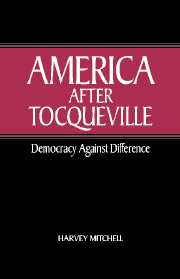Book contents
- Frontmatter
- Contents
- References to Tocqueville's Democracy in America
- Preface
- I PATHS TO DEMOCRACY IN AMERICA
- II BEGINNINGS AND DEMOCRACY
- 4 Beginnings and History: Red and White in Tocqueville's America
- 5 The New England Township Before the Revolution: Tocqueville's American Pastoral
- 6 A Second Beginning: Black and White in Tocqueville's America
- III AMERICAN DEMOCRACY ON TRIAL
- 10 Conclusion
- Works Cited
- Index
6 - A Second Beginning: Black and White in Tocqueville's America
Published online by Cambridge University Press: 10 August 2009
- Frontmatter
- Contents
- References to Tocqueville's Democracy in America
- Preface
- I PATHS TO DEMOCRACY IN AMERICA
- II BEGINNINGS AND DEMOCRACY
- 4 Beginnings and History: Red and White in Tocqueville's America
- 5 The New England Township Before the Revolution: Tocqueville's American Pastoral
- 6 A Second Beginning: Black and White in Tocqueville's America
- III AMERICAN DEMOCRACY ON TRIAL
- 10 Conclusion
- Works Cited
- Index
Summary
Americans, some hundred and fifty years after their Puritan beginnings, looked beyond their settled loyalties to time and place and set in motion a second beginning, which marked them as a mature nation. Freely and deliberately they “approached that lofty pinnacle of glory” by stepping into the space left empty by the dispersal of authority through the Articles of Confederation. The Madisonian view of the Constitution, as we have seen repeatedly, clearly influenced Tocqueville. Madison was confident that the “good sense of the people of America” would not succumb to the “passions of the unthinking,” and would-prefer, “where power is to be conferred” to choose between the “GREATER, not the PERFECT, good.” He argued against a constitutional instrument in which “the authority of the whole society everywhere [would be] subordinate to the authority of the parts … a monster in which the head was under the direction of the members.” He declared against the partisans of state powers that
[U]ltimate authority, wherever the derivative may be found, resides in the people alone, and that it will not depend merely on the comparative ambition or address of the different governments, whether either, or which of them, will be able to enlarge its sphere of jurisdiction at the expense of the other. Truth, no less than decency, requires that the event in every case should be supposed to depend on the sentiments and sanction of their common constituents.
- Type
- Chapter
- Information
- America after TocquevilleDemocracy against Difference, pp. 132 - 182Publisher: Cambridge University PressPrint publication year: 2002



